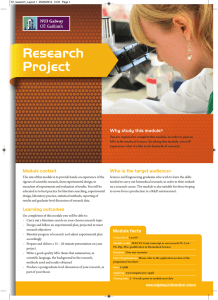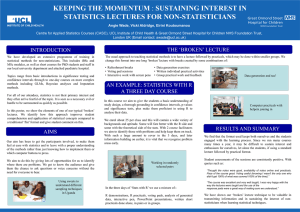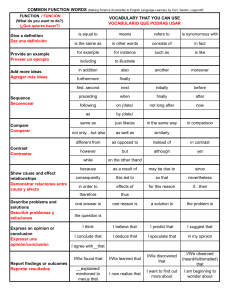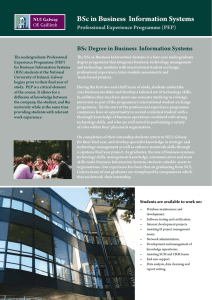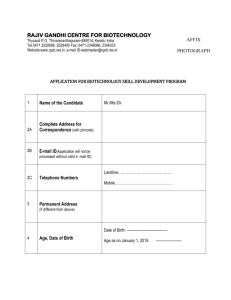Practicals Why study this module?
advertisement
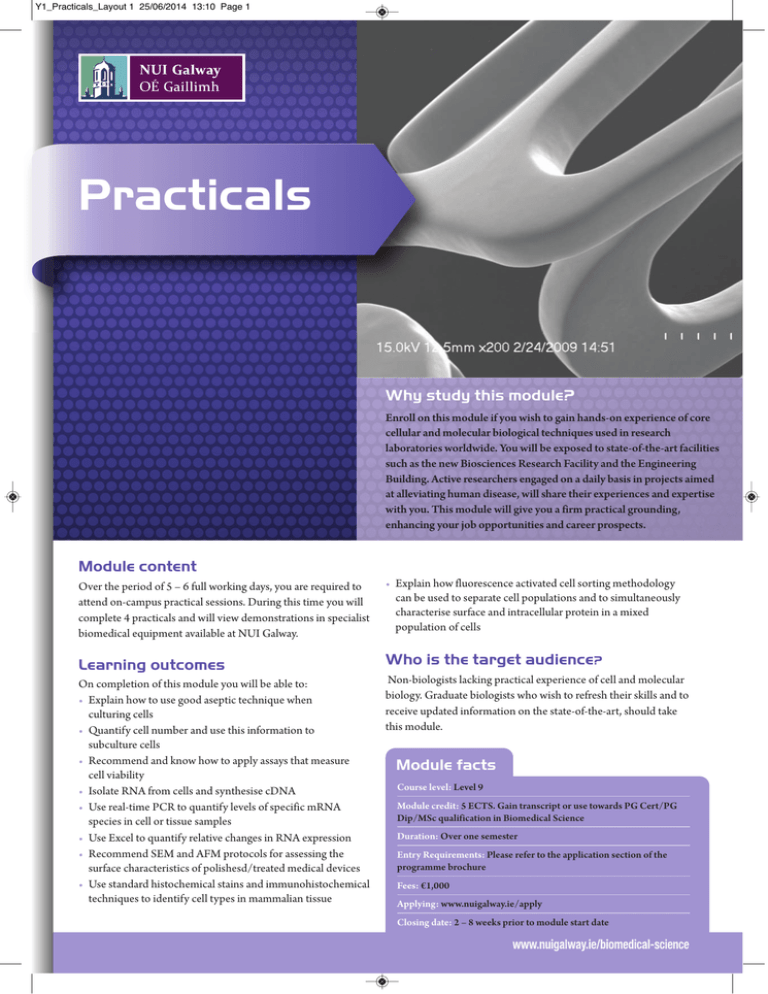
Y1_Practicals_Layout 1 25/06/2014 13:10 Page 1 Practicals Why study this module? Enroll on this module if you wish to gain hands-on experience of core cellular and molecular biological techniques used in research laboratories worldwide. You will be exposed to state-of-the-art facilities such as the new Biosciences Research Facility and the Engineering Building. Active researchers engaged on a daily basis in projects aimed at alleviating human disease, will share their experiences and expertise with you. This module will give you a firm practical grounding, enhancing your job opportunities and career prospects. Module content Over the period of 5 – 6 full working days, you are required to attend on-campus practical sessions. During this time you will complete 4 practicals and will view demonstrations in specialist biomedical equipment available at NUI Galway. • Explain how fluorescence activated cell sorting methodology can be used to separate cell populations and to simultaneously characterise surface and intracellular protein in a mixed population of cells Learning outcomes Who is the target audience? On completion of this module you will be able to: • Explain how to use good aseptic technique when culturing cells • Quantify cell number and use this information to subculture cells • Recommend and know how to apply assays that measure cell viability • Isolate RNA from cells and synthesise cDNA • Use real-time PCR to quantify levels of specific mRNA species in cell or tissue samples • Use Excel to quantify relative changes in RNA expression • Recommend SEM and AFM protocols for assessing the surface characteristics of polishesd/treated medical devices • Use standard histochemical stains and immunohistochemical techniques to identify cell types in mammalian tissue Non-biologists lacking practical experience of cell and molecular biology. Graduate biologists who wish to refresh their skills and to receive updated information on the state-of-the-art, should take this module. Module facts Course level: Level 9 Module credit: 5 ECTS. Gain transcript or use towards PG Cert/PG Dip/MSc qualification in Biomedical Science Duration: Over one semester Entry Requirements: Please refer to the application section of the programme brochure Fees: €1,000 Applying: www.nuigalway.ie/apply Closing date: 2 – 8 weeks prior to module start date Y1_Practicals_Layout 1 25/06/2014 13:10 Page 2 Module topics Cell Culture Directed by Dr. Una FitzGerald • Assessing cell confluence, number and viabliity • Subculturing cells • How to recognise culture contamination • Fixing cells for immunohistochemistry • Light & UV microscopic imaging of cells Molecular Biology Directed by Dr. Enda O’ Connell • Isolation and stability of RNA • Synthesis of cDNA • Quantification of levels of RNA transcripts using real-time polymerase chain reaction methodolgy • Statisitcal analysis of changes in RNA expression Scanning Electron Microscopy (SEM) Directed by Dr. Eadaoin Timmons • Preparation of samples for SEM • Imaging unpolished & polished surfaces • Atomic force microscopy & surface characteristics • Factors affecting quality of SEM Histology Directed by Dr. Jill McMahon • Tissue fixation • Standard histopathological staining of tissue • Immunohistochemistry for cell & protein identification • Assessment of tissue staining • Factors affecting quality of tissue staining Specialist Technology Demonstrations Assisted by Dr. Brendan Harhen, Dr. Enda O’Connell, Dr Shirley Hanley • Mass Spectrometry • Janus Work station • Operetta high content image analysis • Fluorescent-activated cell sorting Module Director Dr. Una FitzGerald Dr. Una FitzGerald directs and lectures on the MSc in Biomedical Science (via distance learning). Una graduated from NUI Galway with a BE in Industrial Engineering and and MSc in Biotechnology. Following five years working in the industrial pharmaceutical sector in Ireland, France and England, Una completed a PhD at the University of Strathclyde (Glasgow). Una spent the next 9 years working as a postdoctoral researcher in Glasgow working in cancer-and neuroscience-related fields. In 2002 she returned to Ireland as a postdoc and in 2006 became the coordinator/director of the MSc in Biomedical Science (via distance learning). In addition to teaching, Una manages a research group focussing on Multiple Sclerosis and neurodegenerative disorders. Dr. Enda O’Connell BSc, PhD Enda joined the NCBES in 2005 from the School of Biomolecular and Biomedical Science and Conway Institute of Biomolecular and Biomedical Research at University College Dublin a B.Sc. in Industrial Microbiology and a Ph.D. in Molecular Microbiology. In his role as Senior Technical Officer, Enda runs the Biosciences Screening Core facility, where stateof-the-art-technology including robotics and high-content image analysis systems enable drug discovery and characterisation to be performed, with the ultimate goal of finding better treatments and improving the health of the Irish population. Enda also provides training and support for researchers in Functional Genomics and Molecular Biology techniques, to examine gene expression and regulation. Dr. Eadaoin Timmins BSc, PhD Eadaoin worked for 7 years in the industrial food and pharmaceutical sectors, before going to Wales to complete a BSc in Biological Science at the University of Wales (Cardiff) followed by a PhD in Analytical Chemistry at the University of Wales (Aberystwyth). On her return to Ireland she worked as a postdoctoral researcher at the National Diagnostic Centre in Galway. In 2001, Eadaoin joined the NCBES, where she has responsibility for specialist microscopy equipment including the SEM and TEM. Histology: Dr. Jill McMahon, BSc, MSc, PhD Jill received her BSc (Hons) in Biochemistry from Queen’s University Belfast after which she trained as a Medical Laboratory Scientist. She worked in the Neuropathology Department of the Institute of Pathology, Belfast, for 8 years, during which time completed an MPhil in Pathology. Jill then did her PhD on Gene Therapy, at Imperial College London. On completion of her PhD, Jill carried out post-doctoral work in the Division of Neuroscience, Imperial College London and in REMEDI and the Caspase Laboratory in NUI Galway and then lectured in Pharmacology & Therapeutics. Since 2008 she has been working as a senior scientist in the Multiple Sclerosis Research Laboratory at NUI Galway. Student testimonial Roisin Lenehan Current position: Medical Scientist (Haematology), Hospital in east of Ireland'. Position held while completing module: Senior Clinical Trial Associate. “There was a wide variety of different practicals to choose from which was great. As the MSc was a mix of biological and engineering modules, you can mix and match practicals in both areas in order to experience different areas. Practicals included Cell Culture, Microbiology & Cloning, Mass Spectrometry, Confocal Microscopy and Scanning Electron Microscopy. I thoroughly enjoyed all the practicals that I undertook and gained valuable hands-on experience. All practicals were explained verywell which enabled you to come away with a clear understanding. In particular I found the module in Mass Spectrometry very interesting as it went through the major components of the machine and the function of each. This gave me an understanding and a valuable insight into how this technique can then measure the characteristics of individual molecules.” Contact details: Email: una.fitzgerald@nuigalway.ie Tel: +353 (0)91 494 440 / 495 045 http://ncbes.eurhost.net/bio/una--fitzgerald.aspx
